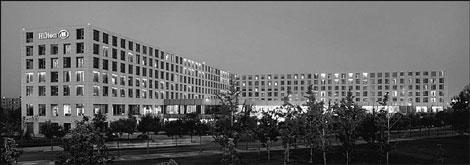
Hilton Beijing Capital Airport. The hospitality market near the airport has not been fully exploited, analysts said. [China Daily]
For picky Mr and Ms Frequent Flier from China and their counterparts all over the world, the newly launched Hilton Beijing Capital Airport says it will guarantee them a pleasant stay, ironing out the frustrations of flight delays caused by inclement weather or nose-to-tail traffic jams.
Just one minute by shuttle bus to Terminal 3, the hotel is nonetheless a haven of Chinese culture, with traditional carved wooden window frames and huge red doors similar to those in the Forbidden City, all dressed with golden nails.
There are 322 guest rooms, including some of the largest in Beijing, all of which are 3.5 meters in height. For night owls, the hotel is home to the longest bar in the capital, stretching 50 meters in an L-shape, alongside several Chinese restaurants and a cigar lounge.
"Launching the first luxury international airport hotel in China on July 28 is more than a noteworthy milestone," said Dave Horton, global head of Hilton Hotels brand.
"Hilton Beijing Capital Airport reflects the innovation, refreshing hospitality and contemporary relevance that enable us to deliver an exceptional experience for our guests and set Hilton as a leader in the eyes of today's savvy global travelers."
Yang Jingdong, general manager of assets at the hotel's owning company, Beijing Capital Airport Tourism Co Ltd, said: "The launching of high-end airport hotels is basically in consideration of our strategy to build an international hub airport for eastern and northern Asia."
Beijing Capital Airport is the nerve center for international travelers in China as well as for a burgeoning business and industrial community that rings the airport. The airport has an average of 1,400 domestic and international flights daily and serviced more than 65 million travelers last year.
According to recent statistics from air analyst OAG, Beijing is now second only to Hartsfield-Jackson Atlanta airport in the US in terms of air traffic, having overtaken London's Heathrow in July.
The first hotel opened near the capital airport in 1979. Now there are tens of hotels and inns nearby, most of them at three-star level but few rated as luxurious.
Analysts said the hospitality market near the airport has nonetheless not been fully exploited.
For Zhu Tongjie, a Beijing-based businessman specializing in the tourism industry, the new hotel is a savior. He has to fly at least twice a week, mostly at around 6 to 10 am.
"I live in southern Beijing and it is a nightmare driving north to the airport during the peak time in the morning," Zhu said. "It is also terrible if I have to take a 6 am flight since I have to get up at 3 am."
He added that now he is able to enjoy a gorgeous spa and a good rest and sip a cup of coffee before taking a leisurely walk to the airport, feeling refreshed and clear of mind ahead of the day's challenges and tough decisions.
Because of the traffic difficulties in central Beijing, more and more businesspeople choose venues near Beijing Capital Airport to hold events, activities, conferences and exhibitions. It is a trend at many other international airports such as London's Heathrow or New York's JFK. Yang said: "Businessmen even set up their operations or administrative complexes in areas around the airport. There are nearly 200 airports on the Chinese mainland without a five-star airport hotel, which does not meet the needs sparked by the booming Chinese economy and the country's status in international business circles."
Another luxury airport hotel, Langham Place Beijing Capital Airport, with 372 guest rooms, is due to open this month.
Yang said both hotels were targeting different groups of customers but providing healthy competition for each other.
"With its solemn style, the Hilton is targeting relatively more mature customers or business people while Langham will be the favorite of younger customers with its fashion and technology-oriented modern atmosphere."
Both hotels will complement the business community surrounding the airport, which features a growing and vibrant mixture of Chinese and multinational companies using Beijing as their global or regional headquarters.
David Prince, general manager of Hilton Beijing Capital Airport, said: "We see the potential and perspectives of Beijing for holding international-level conferences and exhibitions. It is another significant customer source for us."
The hotel offers 21 contemporary function rooms and 2 large ballrooms, with more than 3,000 square meters of meeting space.
"There are roughly 103 five-star hotels in downtown Beijing but there are only two in the airport area," Prince said. He said he was optimistic about the opening of more Hilton airport hotels in China.
Shunyi district, near the airport, boasts an increasing number of residential complexes with luxury villas. The area has become more popular with China's wealthiest when choosing their homes.
The 2010 Hurun Wealth Report, which specializes in tracking the rich, showed that Beijing was home to more of China's wealthy than anywhere else. There are 151,000 people with 10 million yuan ($1.47 million) and 94,000 with 100 million yuan in personal assets.
Prince said it would be another way of life for local people to come to the hotel just for a family dinner or pamper themselves with a treatment in the spa.
In 2010, Hilton plans to open Hilton Rosemont/O'Hare in the United States near Chicago O'Hare International Airport. A new-build Hilton property featuring a stylish horizontal skyscraper design at Frankfurt International Airport is scheduled to open in 2011.





